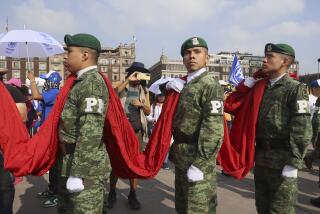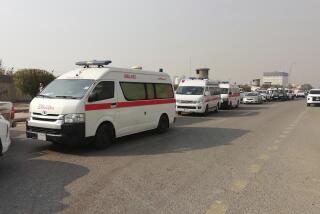Baghdad Governor Killed by Assassins
- Share via
BAGHDAD — Gunmen assassinated Baghdad’s governor and six of his bodyguards Tuesday, part of a wave of insurgent violence that also killed 10 people in a bombing and left five U.S. troops dead in scattered attacks.
Gov. Ali Haidari is the highest-ranking government official to be slain in the last eight months. With violence continuing to roil Baghdad and other cities in the run-up to the nation’s Jan. 30 elections, some senior Iraqi officials are renewing calls to delay the vote.
U.S. officials expressed dismay over the assassination, but said the violence was no reason to postpone the balloting.
“It once again shows that there are murderers and terrorists and former regime elements in Iraq that don’t want to see an election,” Secretary of State Colin L. Powell said to reporters on a trip to Thailand to survey tsunami damage.
White House officials said Tuesday that President Bush had spoken to interim Iraqi Prime Minister Iyad Allawi by telephone Monday to discuss Iraq’s ongoing problems but had not talked about delaying the election.
U.S. Embassy officials and Iraqi election authorities in Baghdad stressed Tuesday night that the vote should proceed on schedule. But President Ghazi Ajil Yawer, who said last month the vote must go forward, on Tuesday urged the United Nations to consider postponing it.
“Definitely the United Nations, as an independent umbrella of legitimacy ... should really take the responsibility by seeing whether that [timing] is possible or not,” he said in an interview with Reuters. The U.N. is providing technical assistance for the vote.
In the last week alone, more than 70 Iraqi police and national guardsmen have died in guerrilla attacks in cities such as Tikrit and Balad. Insurgents have also targeted Baghdad political offices, and on Dec. 21 bombed a U.S. base near Mosul, killing 22 people, including 18 Americans. The violence has been concentrated in Baghdad and Sunni Muslim strongholds to the north and west of the capital.
Despite the continuing heavy toll, U.S. officials insisted that the security situation in Iraq was improving.
“Frankly, I don’t think the security situation is deteriorating,” a senior State Department official in Baghdad told Pentagon reporters in a videoconference briefing Tuesday. “I think the security situation is actually a little better than it was, say, six weeks ago.” At that time, U.S. forces were storming the rebel stronghold of Fallouja.
The official suggested that politicians calling for delays might be engaging in an “electioneering posture” to win support from Sunnis.
U.S. and Iraqi forces have been trying to tighten security in preparation for the elections. But Tuesday’s attack on Haidari demonstrated that even the inner circle of Iraq’s government remains vulnerable.
Followers of Jordanian militant Abu Musab Zarqawi claimed responsibility for the assassination, calling Haidari an “American agent,” according to a statement published Tuesday on an Islamic website. The claim could not be verified.
Haidari, 47, a former Education Ministry official who took office last summer, was killed in a sophisticated ambush less than a mile from the guarded compound in northwest Baghdad where he works and lives.
The father of three had survived at least two previous assassination attempts, including a drive-by shooting in July and a roadside bomb in September that killed two bodyguards.
In November, militants assassinated the deputy governor of Baghdad province, Hatim Kamil, on his way to work.
At a news conference in Baghdad last week, Haidari lamented Iraq’s growing violence, which he said was slowing the reconstruction process and hurting ordinary citizens.
“The greatest problem is the security situation,” he said. “Terrorism is the greatest problem we have encountered.”
Haidari is the highest-ranking public official to be assassinated in Iraq since a May suicide bombing killed Ezzedine Salim, president of the now-defunct Governing Council.
Witnesses say the governor’s three-vehicle convoy was attacked by assailants armed with rifles, machine guns and rocket-propelled grenades who were waiting in cars, by the side of the road and on rooftops.
“There was a group of men just sitting around,” said witness Qassim Nahid Fatlawi, pointing to a vegetable stand by the side of the road. “It turned out they were the insurgents. We had no idea they were waiting for the convoy. When it drove by, they started shooting.”
Two other witnesses said the governor’s sedan escaped the initial ambush and sped away, but his car was attacked at the next intersection by additional gunmen in cars marked as taxis.
Six bodyguards and one Iraqi policeman were also killed in the 10 a.m. attack. None of the attackers was killed or captured, police said.
Colleagues said the heavily guarded Haidari was aware of the risks he faced but preferred not to dwell on them.
“He never wanted to think about it or talk about it,” said Ali Nasser, a security guard at the governor’s compound.
Despite the dangers, Haidari earned praise for forging ahead with rebuilding projects in the capital, including water treatment facilities, new sewage pumps and trash collection service.
“Baghdad is waiting for these projects,” he said last week. “Baghdad needs these projects.”
At times, the governor was an unabashed supporter of U.S. forces in Iraq, whom he often thanked for helping to fund local projects.
But he didn’t hesitate to stand up to American officials, such as in October when he called upon the U.S. to vacate the so-called Green Zone and give it back to the citizens of Baghdad.
The assassination occurred about the same time Tuesday morning that a fuel tanker packed with explosives rammed a police checkpoint near the Interior Ministry, killing eight ministry commandos and two civilians. Another 60 people were wounded.
Some of the victims were recruits who had lined up to apply for work.
“We know these are very dangerous jobs, but what can we do? These are the only jobs we can find,” said Mohammed Nadhir, 32, who was injured under his eye.
Five U.S. troops were killed Tuesday in separate attacks, bringing the total number killed in Iraq to 1,336, according to a tally by Associated Press.
In northern Baghdad, three U.S. soldiers were killed and two were wounded by a homemade bomb, the military said.
In Balad, north of the capital, a soldier with the 1st Infantry Division died in a bomb attack that also wounded another soldier. And a Marine with the 1st Marine Expeditionary Force was killed in action in western Iraq.
Further details about the attacks and identities of the victims were not released.
Separately, violence continued to rock the northern city of Mosul, despite the infusion this week of 6,000 additional U.S. and Iraqi troops.
Unknown assailants kidnapped and killed the deputy chairman of the Sunni-dominated Iraqi Islamic Party in Mosul, officials said.
The body of Omar Mahmood Abdullah was found Tuesday night dumped near a hospital in the western part of the city. Hospital officials said he died from a single gunshot wound to the head.
The motivation for the attack was unclear. The Iraqi Islamic Party, the nation’s most prominent Sunni Muslim religious party, recently announced it was pulling out of the parliamentary election.
Last weekend, several officials on Mosul’s electoral commission abruptly resigned, citing death threats against them and inadequate protection.
Staff writer Mark Mazzetti at the Pentagon and special correspondents Suhail Ahmed and Saif Rasheed in Baghdad and Roaa Ahmed in Mosul contributed to this report.
More to Read
Sign up for Essential California
The most important California stories and recommendations in your inbox every morning.
You may occasionally receive promotional content from the Los Angeles Times.













